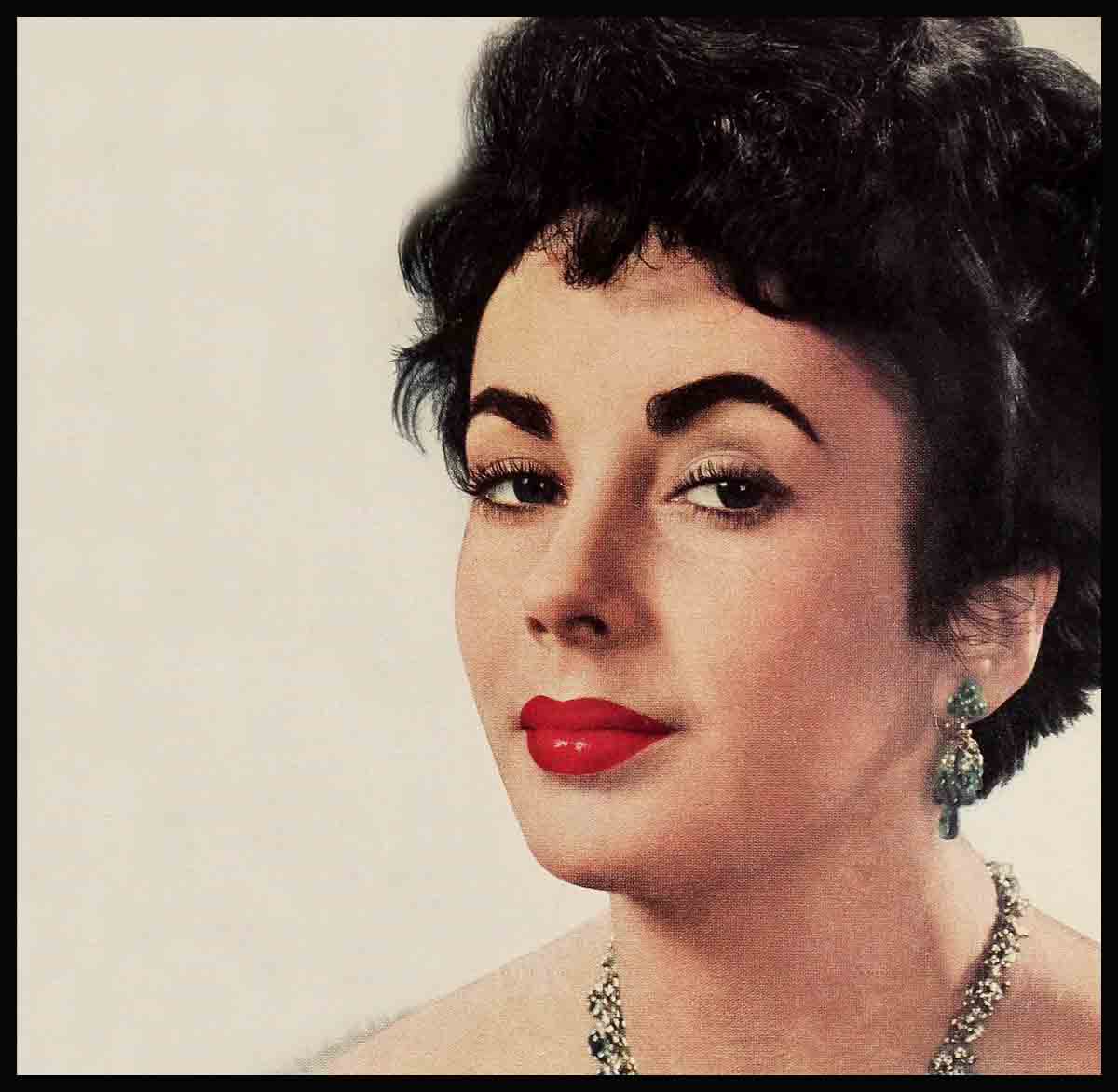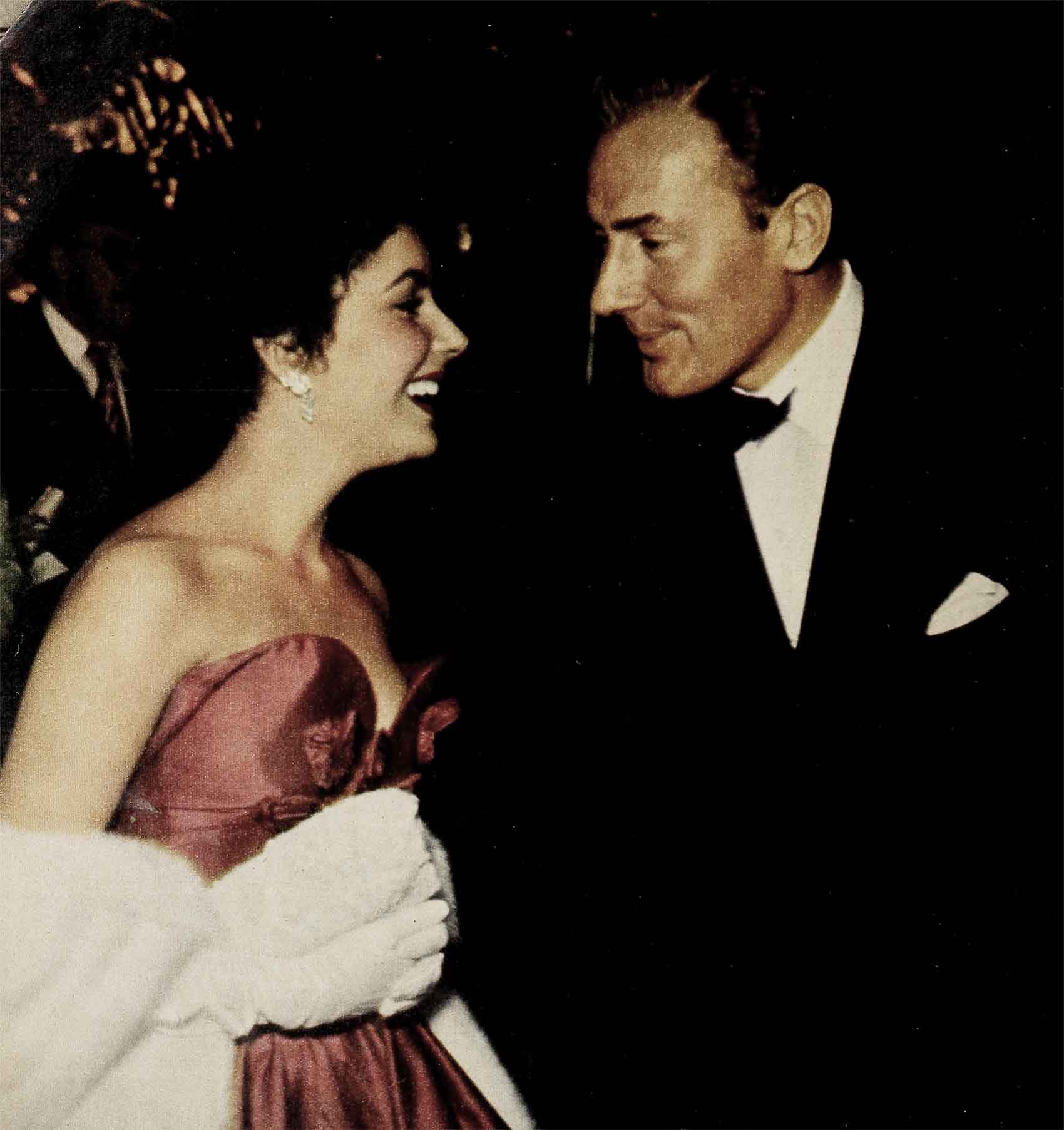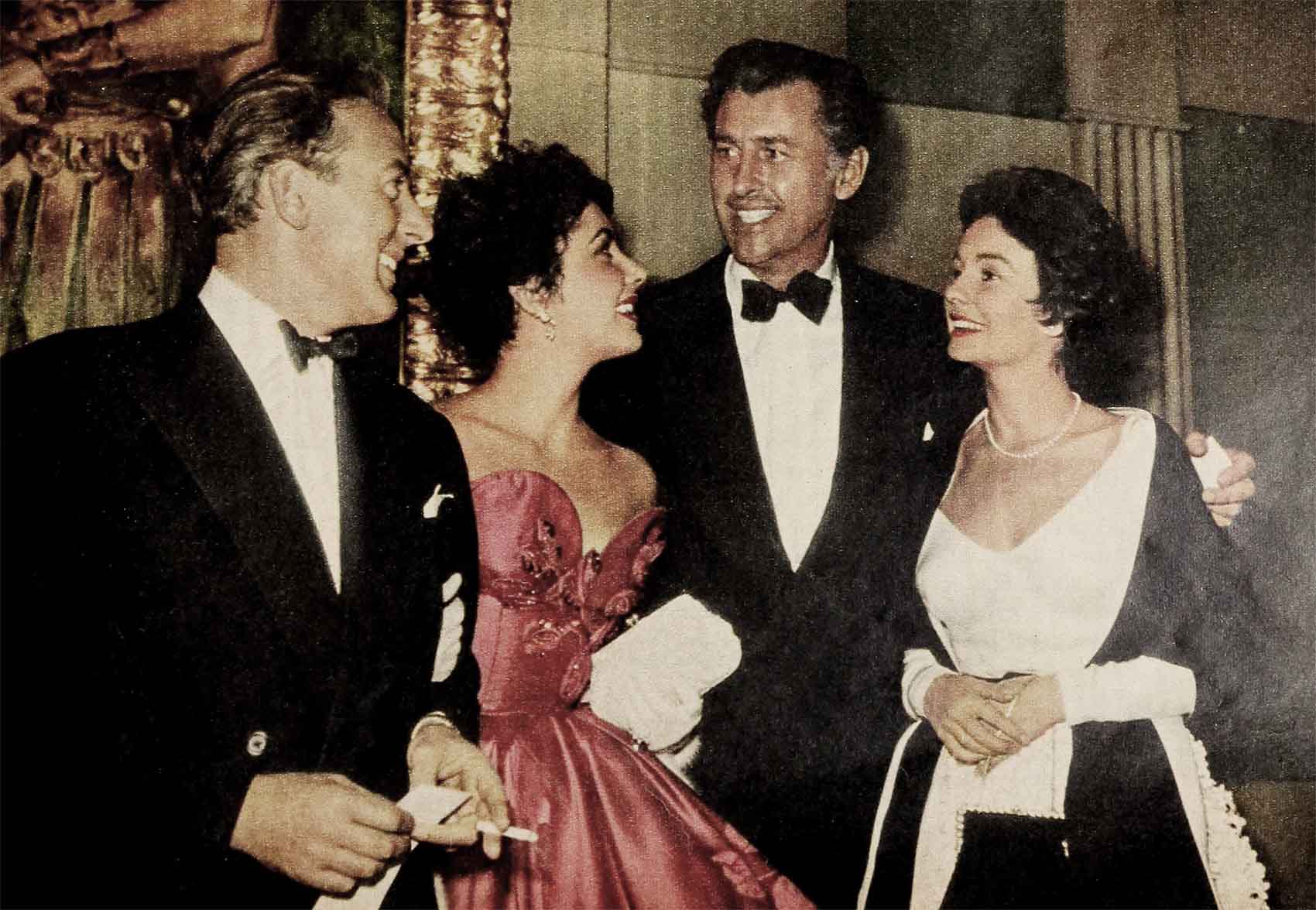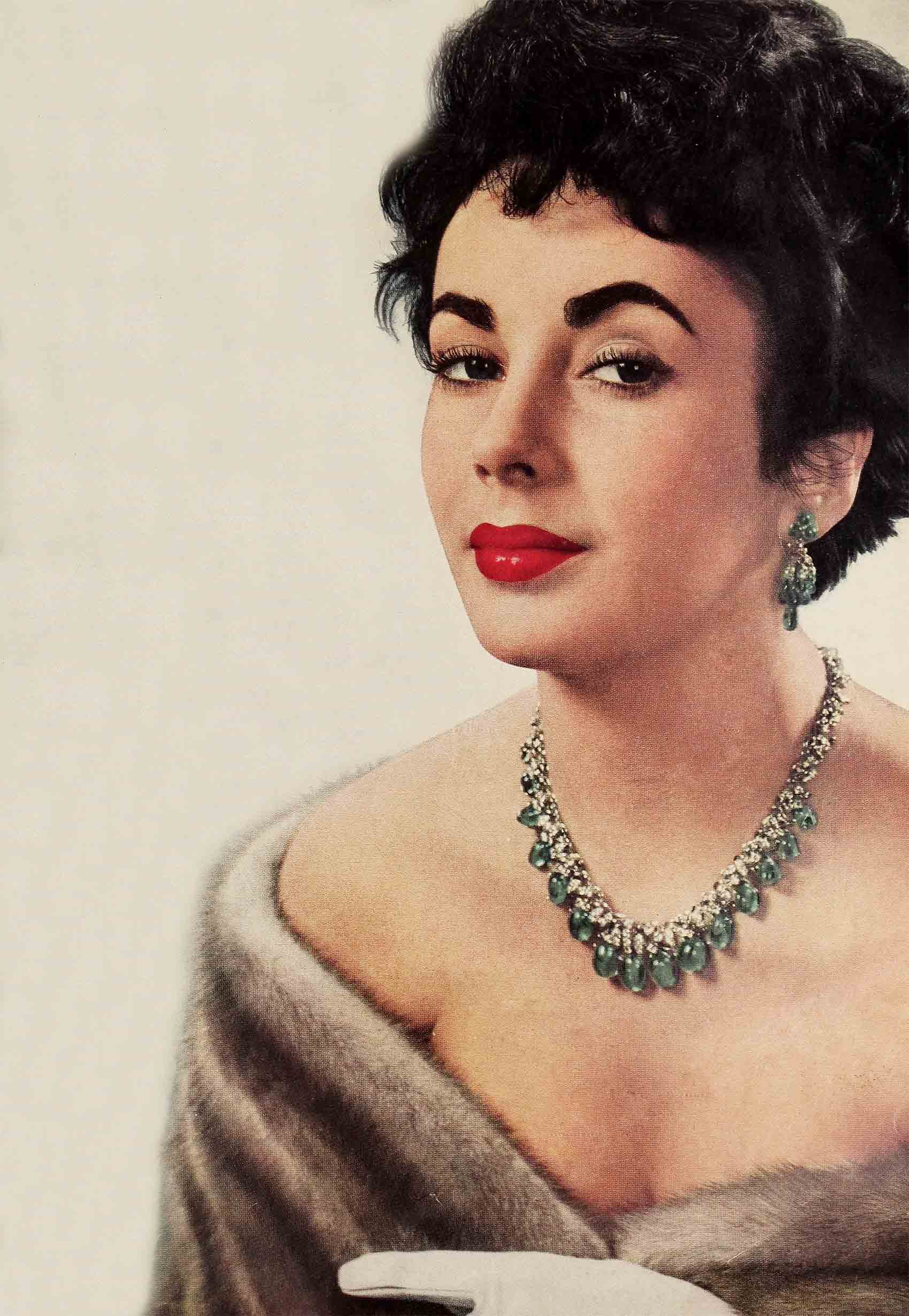
Elizabeth Taylor Does It Again
By the time you read this, Elizabeth Taylor will be Mrs. Michael Wilding. Whether Liz and Michael marry in Hollywood, in England or in Mexico, the British actor will be husband number two for our great screen beauty.
Liz to me has been the Helen of Troy of Hollywood, just as Helen must have been the Liz Taylor of Troy. Both represent Beauty in their time, plus a remarkable talent for getting into situations.
Helen started a war. If men went to battle over women today, Liz would touch off many an incident. But wars are colder things now, so she’ll probably go down in history as the gal who hit top score in male conquests.
Romance, for her, has been swift, impassioned and full of ups and downs. At 19 she has two broken engagements, one divorce, an interrupted near-engagement to her credit. Now comes Wilding, the Englishman with whom she’ll take a second fling at matrimony. Liz doesn’t admit this in so many words. She doesn’t need to; she wears a huge sapphire set in platinum and surrounded by diamonds on her third finger—it speaks for itself.
Wilding is a new type for Liz Taylor. He is balding, officially 39 but more often referred to as mid-fortyish. But he could give Casanova lessons in how to kiss a lady’s hand. He is a big wheel in British movies and off-stage has. tremendous personality and charm—such charm he can make his superiority in years over Elizabeth seem to be an asset. In romance, Wilding is a sophisticate—he has been married and just recently has been divorced—and he is a post-graduate of the Marlene Dietrich school of romance since “Grandma” Dietrich was Liz’s immediate predecessor. This gave rise to the waggish remark that he must really be in love with Liz since he wore his hair piece all the time for her whereas he only wore it for parties when he was romancing Marlene.
Liz will be free to marry on January 29th. Kay Young, the actress who married Michael in 1937, sued him for divorce on Nov. 15th. Since an English divorce takes only six weeks, Wilding will be back in bachelor’s ranks before Liz is free. Liz will be 20 on February 27th and somewhere around these times there’s a wedding date in the offing unless they jump the gun and marry over the border. Neither will make a definite admission: Liz talks around the subject while twiddling that enormous sapphire ring and Michael smiles and says: “How can I discuss marriage to Elizabeth when I am not yet free?” The sheer logic of this leaves questioners holding the bag. But word has gone out that Kay Young is all set to marry Douglas Montgomery—one-time Hollywood actor who has lived in England for many years now—so everyone is paired off as satisfactorily as the final act of a French farce.
The fly in the ointment of Liz and Michael’s romance in its early days was his marriage. They met three years ago when Liz was in England making a picture with Robert Taylor. Her mother was along and Michael Wilding was working in the same studio. They fell in love when Liz went back to England to make Ivanhoe last summer. As Wilding was married, there was gossip, and so Metro snagged its beauty back to New York for a personal appearance at the Quo Vadis premiere, thinking that would be the end of the matter. But Michael followed her to Hollywood where he took up residence with his old-time pals Stewart Granger and Jean Simmons and successfully pressed his suit. Liz has been a house guest of the Grangers also—she believes in getting to know her fiances at close range. Bill Pawley was the Taylors’ guest for a fortnight during that romance and Liz and her mother visited the Pawleys in Florida. At that time Liz told me: “You can’t tell too much about your feelings for a man if you’re just together at parties. You can think you like somebody terribly much in an atmosphere like that, but it might be just the glamor. When you’re around together all day and have a quiet time you find out many important things that show each other’s character and disposition.”
Liz’ publicity has progressed from mice to men with lightning speed. One day she was concerned only with Nibbles her chipmunk, her dogs, cats and horses; the next, she had discovered sex. The gold football which Glenn Davis, All-American West Pointer, gave her as a pledge of his affection moved rapidly in a forward pass to Bill Pawley Jr., to Hilton, to Donen, to Wilding. There was some slight interference from Montgomery Clift, and Bob Taylor’s name entered and faded out again from a long list of dazzled boys who managed one or two dates but couldn’t catch her interest.

There is a threadbare tradition that beauty and brains never go hand in hand. I say threadbare because my experience has often been to the contrary. Liz Taylor can parry questions with the skill Early in life she learned indirect statement. She knows a denial is easier to wriggle out of than an affirmative answer. Generalizations are a favorite refuge with her and when put to it she can fall back on humor as a quick get-away.
When I asked her about Mi ing she was in a negative mood. She ha returned from New York where she’d had a lot of publicity about dates with Montgomery Clift and about some hand-holding on back roads she’d done with her ex, Nicky Hilton. But Wilding had arrived in town, the two of them were at the Grangers and there was good reason for questioning.
We began our interview with some discussion about A Place In The Sun and I asked Liz if she thought she’d be up for an Academy Award.
She replied: “Are you kidding, Hedda?”
I said no, I wasn’t kidding, that I thought it her best performance: “Didn’t you think it was?”
“I liked it,” she replied. “And I loved working in the picture. I hope it gets nominated for an award, the picture. I mean.”
For diplomatic modesty this took the cake: “Aren’t you being very modest about it?” I asked.
But Liz said no, that she didn’t think she was being modest. And when I asked her how Monty Clift was she came back with:
“He’s just fine. You mean when I saw him in New York, don’t you?”
“Yes, that’s what I mean,” I said. “How many dates did you have with him?”
Her answer was nonchalant: “I don’t know . . . a few . . . didn’t keep count.”
When I intimated there might have been so many dates she’d lost count she quickly corrected me: “No, there weren’t many at all.” And when I inquired if Clift was more social now than he used to be she told me: “I think he’s always been social.” “Well, he didn’t look that way out here,” I said. “Out here he gave a pretty good imitation of a hermit. Nobody ever saw him at premieres or out where there were people.”

“I guess he doesn’t like night clubs,” Liz said with a finality that ended discussion of Monty and his notions. I wanted to know when he was coming back to. Hollywood and she tied that answer strictly to business: “When he finds a good script, not before.”
So we got around to Michael Wilding, a subject which had been quivering between us from the beginning of the interview. It was the main issue, and one to be handled with kid gloves. I said:
“What do all your male admirers in America think about your dating an Englishman? Aren’t they crying “unfair?”
“Nobody has said a thing to me about it,” said Liz although the columns were full of the fact that Stanley Donen was planning an excursion to Mexico to ease his broken heart.
Fencing became monotonous so I decided to take the bull by the horns: “What has Michael Wilding got that American fellows don’t have?”
Liz giggled: “An English accent.”
“Is that all?”
“Well . . . he’s a man.”
“Your American beaus are men, too, aren’t they?”
“Uh-huh,” said Liz . . . then silence.
“Wilding is older than you. Is there any advantage in going with an older man?”
“I don’t think of him as an ‘older’ man”—her tone put my word older into quotes.
“Is he more considerate of you younger fellows?”
“I don’t know. He couldn’t be sweeter. He’s a wonderful person.”
I wanted to know what their common interests were, aside from music, but Liz was vague: “Oh, just common interests—getting fun out of life. I’m having a wonderful time. Right now, I really am.”
“More fun than you’ve ever had before?” I said.
“Yes, I think so,” she replied with great certainty. It was tough digging, trying to strike a vein. “Just why do you prefer Michael to all the others?” I asked. “Oh, I like them all,” said the diplomat.

We then discussed Stanley Donen—another subject foremost in our minds. Liz knew I had not thought this a good romance for her. She did not know, however, that I had suggested to Metro they could kill two birds with one stone by sending Liz to England to work in Ivanhoe when Deborah Kerr became pregnant and could not do it. I felt they could get a capable replacement in Liz and, at the same time, get her away from Donen to whom she had turned on the rebound of her divorce from Nick Hilton. I asked her: “When did you fall out of love with Stanley Donen?”
“What,” cried Liz in amazement, “is all this talk about love?”
“Do you know how you got to England?”
“I flew,” Liz said facetiously.
When I told her I was responsible for it, she thanked me prettily and hoped I would like the picture. I asked her if she knew my reasons for getting her into Ivanhoe and explained it was purely to get her away from Donen and she said:
“Why? He’s such a wonderful friend.”
“I’m as bad as your mother,” I explained. “I didn’t think he was right for you.” I’ve known this girl since she was a sprout knee high when her mother brought her to my house to sing for me in a piping baby voice. The voice wasn’t much but the child was so unbelievably beautiful I knew she was destined to play a big role in life. She started romancing so young that her parents took a hand in things, perhaps not wisely. Her mother did much to break up the Bill Pawley romance. Bill wasn’t a millionaire, for one thing, and her mother ambitiously thought her gorgeous child should chalk up a record financially as well as in other ways. By the time Donen entered the picture Liz and her mother were not on speaking terms, so fast had been the romantic pace. She was living in her own bachelor apartment with Peggy. Rutledge, a secretary-companion, and was fast becoming a night club figure with the ambitious director. As Donen’s wife was in process of divorcing him, he was red-hot in print as Liz’s constant escort. He drove her blue car about and friends who dropped in on her informally either found him there, or he telephoned her during their stay. If that isn’t romance, Hollywood style, it’ll do until the real thing comes along. But to my surprise when I suggested to Liz that she might have married Stanley Donen had she remained here instead of going to England, she said: “Oh no!” very decidedly. I told her I knew I was an interfering old friend but I had her good at heart. This brought out an unsolicited statement: “Hedda, I’m not in love with anybody.”
Well, love was in the air in England as stories of Liz and Michael’s romance were the sole topic in the letters my friends been writing me when she was making Ivanhoe. When her studio brought her back to this country, she pined between dates. In fact her many dates in New York, including those with Nick Hilton, seem to have been for the purpose of keeping her mind busy and off the subject of her absent love. So when Liz made that gratuitous statement “I’m not in love with anybody,” (although she was with Michael Wilding at the close range their position as house guests of the Grangers permitted) I looked at it in the logicians way of reasoning: I’m not in love with anybody, I’m in love with somebody, and came to my own conclusions. I suggested to her that perhaps she was just in love with love.
“Maybe that’s it,” she answered hopefully, dying to get off the subject now that she was losing control of it.
“If you were free now, this minute, would you marry?”
She slipped back into the old generality: “Some day I hope to marry.”
“Will you marry in February?” I persisted.
“I doubt it. I’ll still be practically married then.”
I had the date of her final decree in mind—Jan. 29th—when I said: “You will be free by February?”
“Just,” she said, and I could hear the door to her confidence swing closed.
I’d often wondered how this girl felt about her marriage to Nicky Hilton. It had begun so auspiciously. It was the perfect wedding. No one had ever seen such a divinely beautiful bride, such a proud young groom. Back from her European honeymoon floated the tales of her unhappiness—tales of tears and stormy scenes, of a little bride left to sit in a hotel room with a toy poodle while her groom hung over the gaming tables until all hours of the morning. When Liz told it all to a Judge seven months after the ceremony, she was wearing one of her trousseau frocks. I wondered then if she wished she’d never left her family roof, never sat in that grey courtroom on a rainy day and told the sordid little story of those seven months while her father, her lawyers, a publicity man and four damp spectators with dripping umbrellas, looked on.
“Have you ever regretted marrying Nicky Hilton?” I asked her.
“I haven’t regretted anything I’ve ever done,” was her assured rejoinder.
“Do you think your Marriage was a valuable experience?”
“Yes, I do. It helped me a lot.”
“In what way?”
“It taught me a lot of things. I learned them early. Maybe it would have been a long time before I learned them . . . it was an unhappy experience . . . I’m sorry it didn’t work out.”
“Tell me,” I said, “if you were advising a young girl, would you advise her to marry when she’s 21.”
Elizabeth said: “I don’t think age has everything to do with it.”
When I asked her if she didn’t think her youth and inexperience Was partly responsible for the breakup of her marriage, she replied:
“I’m sure it was: but I don’t think you can put down a rule and say you should marry when you’re 21.”
During the course of our interview I told Liz I was happy to hear she had made up with her mother and I wanted to know if she had met Wilding. “Yes,” Liz said, she met him in England, “when we were making a picture there three years ago.” There was a time when her mother Was convinced she and her daughter felt and thought as one person. Those were the days when Mrs. Taylor was under salary to Metro as Liz’ companion and mentor and supervised her contacts and interviews. So far as I could see there was great rapport between them at that time, evidence of love and complete understanding. Often Mrs. Taylor would speak for her daughter; but Elizabeth did not make all her mother’s statements come true. Mrs. Taylor had given an interview in Florida in June of 1949 in which she had dismissed the “friendship” of Glenn Davis as just that, had announced an engagement to young Pawley and allowed the press a peep at a three and a half karat diamond engagement ring, but had prophesied her daughter would not marry Pawley before the following spring. By holidaytime the newspapers were writing about Conrad Hilton Jr. “the new fiance” and Elizabeth was married in the spring, but not to Pawley. She married Hilton instead. Somewhere in between that first announcement about Glenn Davis (incidentally he had sent Liz a necklace of pearls from Korea and was en route to visit her in Miami with an engagement ring in his pocket when the Pawley lightning struck) the minds of mother and daughter moved in opposite directions. The teen-ager who had begun to think of life in terms of specially-built cars and mink coats, had developed such high frequency sex-appeal that reporters were inquiring about Stanley Donen when they crowded around her after she was handed her interlocutory decree.
As a studio property, Elizabeth Taylor has been estimated as worth anywhere from 50 to 100 million dollars to the men who make her pictures. Hers is a face with no bad angles, say cameramen. Billy Grady, Metro’s casting director, defines the ingredients for stardom as “a compound of beauty and witchery.” Well, Liz Taylor certainly has the beauty. She represents in terms of futures a colossal sum to any studio. Michael Wilding as an excellent actor and man of charm is far more easily replaceable to the men who guide his career.
“Do you think an actor would make you a better husband than a businessman or someone out of the profession?” I asked.
She spoke up quickly: “I don’t think it matters what a man’s profession is. It’s what he is himself that matters.”
Like other girls in love, Liz wants children but hasn’t thought much about it: “I don’t know how many . . . I’m not even thinking about that now, I think it’s a little premature.”
With her typical modesty she shrugged off my suggestion that Donen is carrying a torch for her. When I suggested that is what people are saying around Hollywood she told me: “Don’t believe everything you hear.” She says Donen and Michael Wilding have met (“We just ran into each other about town, there was nothing planned.”) and that it went off very well.
When I asked her if Michael thought she is a pretty good actress I learned to my surprise that he has never seen the object of his affection on the screen:
“Why don’t you take him to see you?”
“I don’t want to take him.” She had no explanation for this beyond a reiterated: “I just don’t want to take him.” Liz has seen Michael’s work in Lady With A Lamp. I said: “If you went to see his picture why wouldn’t you take him to see yours?”
“That was different,” she said patiently. “It was a premiere. It’s something you have to do. He had to be there so he took me along. Just going to a movie is quite another thing.” But Liz finally admitted that Michael has asked to see her in a picture but she’s been too busy “having fun” to take him.
I daresay professional beauties grow bored with the steady stream of compliments they must accept and recognize graciously. A girl in such a frame of mind would far rather be told she’s “interesting” or “exciting.” When I asked her if she found it a disadvantage being one of the most beautiful girls in the world, she said:
“I’m not, so I wouldn’t know. Beauty is a matter of individual taste. I think Jean Simmons is the most beautiful girl in this country.” When I suggested she and Jean look very much alike she said: “Oh no, I only wish we did.” I reminded her that four years ago when she and Jean came to my house they were alike as two peas in a pod and could have passed as sisters since they have the same coloring. Liz agreed about the coloring.
Elizabeth Taylor has never regretted being a movie star. Since she’s been in the limelight the greater part of her life, I suppose it would be difficult for her to imagine an existence away from it. But she admits that the fact she is a star might have had something to do with the breakup of her marriage, although she added, “It’s hard to tell about that.”
When I suggested she’d have to skip across the Atlantic if she married Michael because his work is in England, she reminded me that it was only an “if” and that there was nothing definite about it.
She has one more year to go on her present contract. She has thought about doing a stage play but nothing definite, thinks perhaps motion pictures are not such hard work. And she found making pictures in England no more difficult than here unless you’re shooting outdoors when the weather becomes a hazard. “We brought in Ivanhoe under schedule,” she told me as evidence of this. She doesn’t know if she’s good in it because she says, “I haven’t seen any of the rushes.”
Although Liz admitted she and Michael and the Grangers had planned a trip to Acapulco she said she expected to spend the Christmas holidays with her family and Michael. During our talk about England we discussed “Little Swallows” the house where she was born. Liz in an impulsive mood, once wanted to buy the entire “Great Swifts” estate but was talked out of it by her advisers. Another time she bought so heavily in the Paris salons she overran her checking account. This girl goes all out when she’s interested in anything. She said the Queen of Jugoslavia had her little house now and some Marquis had bought the entire estate she had dreamed of owning. English by birth, Liz loves the country and would be happy to live there: “I’ve always wanted to go back,” she told me.
She would not admit she plans to marry in February but her “I don’t imagine so,” has no solidity to it. It was a diplomatic murmur by a well-trained actress.
“I bet you’ll marry right off, when you’re free,” I said.
“I might,” she conceded, “I don’t know, myself, and I’m not going to wager. I’m not a betting woman.”
I said: “I’ll bet you marry as soon as possible after the 29th. I think you’re a gone goose this time.”
“You do, huh?”
“Yes, you’re in love with love.”
“Now that,” said Liz, “is my line; I’ve used it before with you, if you remember.”
I said: “I hope you’ll be happy when you marry Michael Wilding.”
“I’ll be sure, this time,” Liz said, “I’ll know when I marry and I’ll be happy.”
THE END
—BY HEDDA HOPPER
It is a quote. MODERN SCREEN MAGAZINE MARCH 1952




